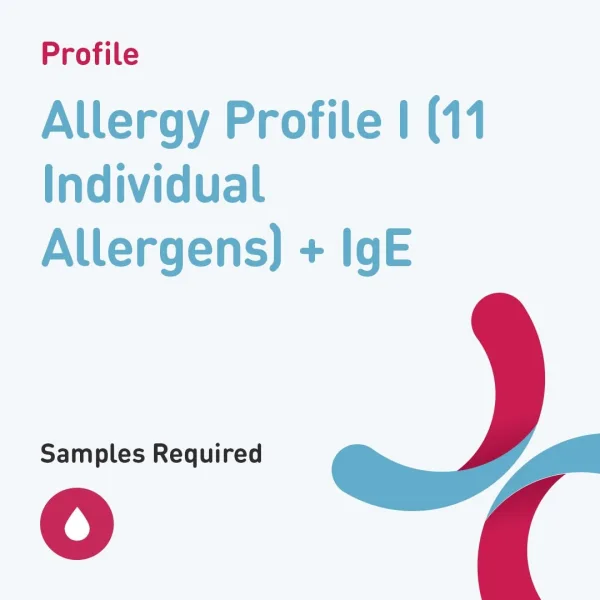Medical Diagnosis Exams
Allergy Profile I (11 Individual Allergens) + IgE
£161.00
Build your own profile, choose 11 allergens – full list can be found here.
Allergies (also known as ‘hypersensitivities’) are the immune system’s overreactions to particular substances. Hypersensitivities are grouped into four types based on what parts of the immune system are activated and how long it takes for a reaction to occur.
In type I hypersensitivity, a particular foreign substance (or ‘allergen’) reacts with a specific type of antibody called immunoglobulin E (IgE) causing symptoms to appear within minutes.
In type IV hypersensitivity (delayed-type), the allergen reacts with a specialized type of cell called a T-lymphocyte and symptoms may take hours or days to appear.
In the respiratory tract, the acute allergic reaction causes coughing, nasal congestion, sneezing, throat tightness, and, in the long term asthma. It can also cause red itchy eyes. Acute allergic reactions in the GI system start in the mouth with swelling of the tongue and throat, followed by abdominal pain, muscle spasms, vomiting and diarrhoea.
Any severe acute allergic reaction can be potentially life threatening, causing anaphylaxis, a reaction spread throughout the entire body that can start with agitation, a ‘feeling of impending doom’, pale skin (due to low blood pressure), and/or loss of consciousness (fainting). Anaphylaxis can be fatal without the rapid administration of an adrenaline or cortisone injection.
The diagnosis of an allergy starts with a careful review of the patient’s symptoms, family history, and personal history, including: the age of onset, seasonal symptoms, and those that appear after exposure to animals, hay, or dust, or that develop in specific environments (e.g. home and work).
Other environmental and life style factors such as pollutants, smoking, exercise, alcohol, drugs, and stress may aggravate the symptoms and should be taken into consideration. Once the list of possible allergens has been narrowed, specific testing can be done.
Once an allergy has developed, the best way to prevent a reaction is by avoiding exposure wherever possible. In the case of food, this may mean a lifetime elimination of that substance from the diet and vigilance in watching for hidden ingredients in processed and restaurant food.
Immunotherapy is sometimes recommended if the allergen cannot be avoided.
In the case of anaphylaxis, adrenaline injections are required. Those who have severe reactions must carry adrenaline with them at all times. Anyone who has a reaction and uses adrenaline should seek medical treatment, as follow-up treatment is often needed.
Samples required: 1
Results in: 2-5 working days
Exams included:
- Immunoglobulin E (IgE)
There is an additional £15 phlebotomy fee for every donation.



